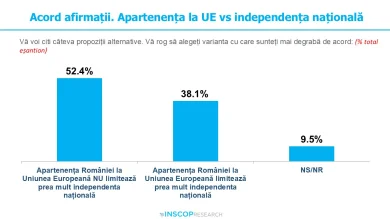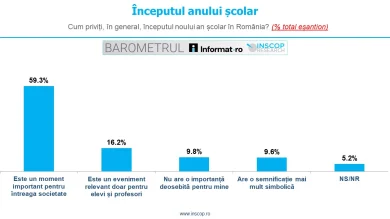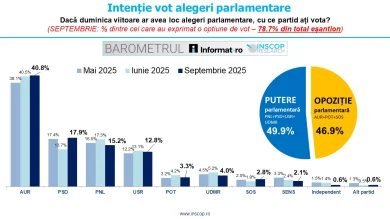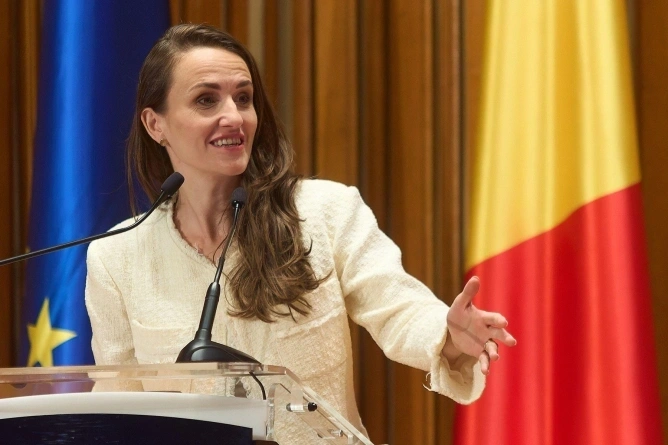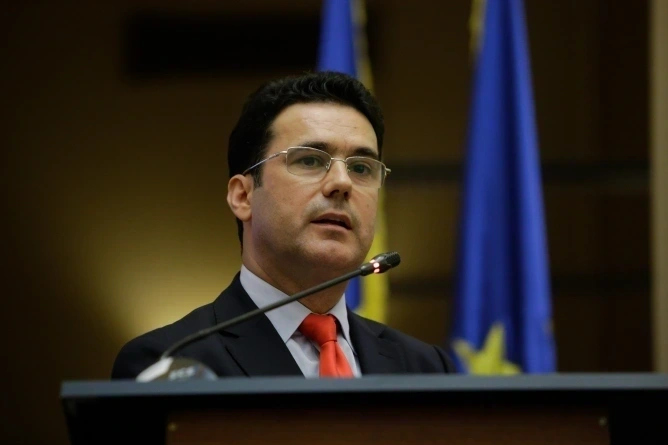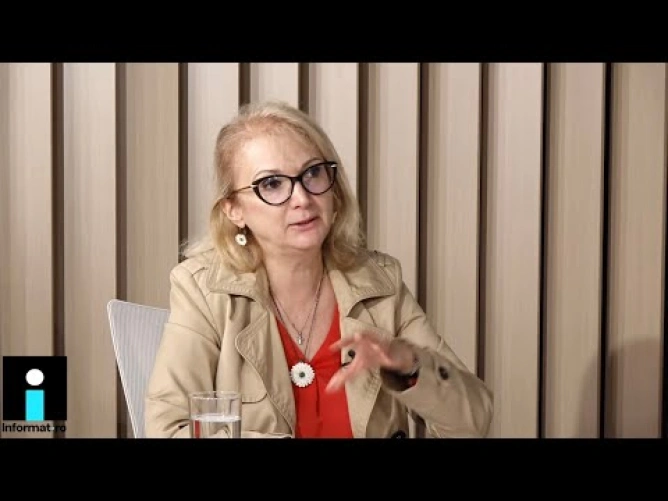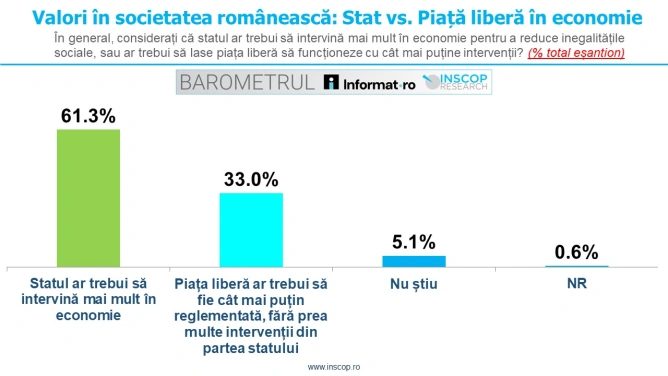
Chapter 3: Values in Romanian society. Economic interventionism and cultural conservatism
According to BAROMETER Informat.ro – INSCOP Research, edition III, conducted between September 1 - 9, 2025, 6 out of 10 Romanians believe that the state should intervene more in the economy.
BAROMETER Informat.ro – INSCOP Research is a monthly opinion poll conducted by INSCOP Research on behalf of the news platform Informat.ro in partnership with the Strategic Thinking Group think tank.
BAROMETER Informat.ro – INSCOP Research aims to bring to public attention topics of interest to stimulate national conversations about various subjects and essential public policies for the present and future of Romania, based on the opinions of Romanians in partnership with think tanks and prestigious academic institutions. It is an initiative through which we aim to contribute to the strengthening of democracy by using scientific and credible tools that bring the voice of citizens to the forefront of public debate.
Methodology: Data was collected between September 1-9, 2025. Research method: interview via questionnaire. Data was collected using the CATI method (telephone interviews), with a simple stratified sample volume of 1103 people, representative of significant socio-demographic categories (gender, age, occupation) for the non-institutionalized population of Romania, aged 18 and over. The maximum allowable error of the data is ± 2.95%, at a confidence level of 95%.
Graphical presentation of the data is available here: Values in Romanian society. Economic interventionism and cultural conservatism
Remus Ștefureac – director INSCOP Research: "The Informat.ro-INSCOP Barometer shows that a large part of Romanian society (approximately 60%) supports hybrid values, a blend between economic interventionism and cultural conservatism that combines the reflexes of traditional left (which hyperbolizes the role of the state in the economy) and reflexes of traditional right (which emphasizes traditions and national values). These population options can partially explain the adherence to specific political representations of conservative populism. 61.3% of Romanians believe that the state should intervene more in the economy, while only 33% support a free market with minimal interventions, and 58.3% of respondents choose tradition and the preservation of national values, compared to 36.7% who prefer progress and adaptation to modern changes. Although we are at the peak of a cycle in which the accumulation and economic development of Romania are massive compared to the situation of general impoverishment from 20 or 30 years ago, the unequal distribution of wealth, the feeling of social insecurity, economic crises, inflation, and various global ideological trends, exacerbated by the information war, fuel an economic culture in which social security and redistribution are perceived as priorities over market efficiency. These perceptions are even more intense among the youth (18-29 years), who are most attached to the idea that the state should intervene more in the economy. However, the proportion of one-third of the population pro-free market indicates the existence of a consistent base for liberalization policies, especially in certain socio-demographic segments. Regarding cultural conservatism, profile data show that young people (18-29 years) and those with higher education are massively oriented towards progress and modernization, while older groups and the rural environment favor tradition. The data from the Informat.ro-INSCOP Barometer show a generational and educational polarization that can translate into political and cultural divides in the medium term. These options suggest an orientation towards security and stability, rather than risk and change. Politically, they seemingly create fertile ground for parties or leaders who promise social protection and national identity. However, almost 4 out of 10 Romanians emphasize progress and modernization. The fact that they are especially found among the youth, the urban population, and those with higher education shows that, in the long term, Romanian society could evolve towards more openness and modernization, even though conservative reflexes currently dominate. The subject has profound implications for the future of Romania and requires in-depth research."
State vs. Free market in the economy
61.3% of Romanians believe that, in general, the state should intervene more in the economy. On the opposite end, 33% believe that the free market should be as little regulated as possible, without too many interventions from the state. 5.1% do not know, and 0.6% do not respond.
Supporting the opinion that the state should intervene more in the economy are 71% of PSD voters, 68% of PNL voters, 61% of USR voters, and 57% of AUR voters, respectively 56% of men and 66% of women, 67% of young people under 30 years old, 64% of those aged between 30 and 44 years, 54% of those aged between 45 and 59 years, and 62% of those over 60 years old. 58% of those with primary education, 64% of those with secondary education, 58% of those with higher education, 60% of residents in Bucharest, 60% of those in urban areas with over 90 thousand inhabitants, 70% of those in small urban areas, and 58% of those in rural areas, respectively 72% of public sector employees and 60% of those working in the private sector believe that the state should intervene more in the economy.
Those who believe that the free market should be as little regulated as possible, without too many interventions from the state include 27% of PSD voters, 25% of PNL voters, 38% of USR voters, and 37% of AUR voters, respectively 38% of men and 28% of women, 31% of young people under 30 years old, 30% of those aged between 30 and 44 years, 41% of those aged between 45 and 59 years, and 29% of those over 60 years old. 32% of those with primary education, 31% of those with secondary education, 39% of those with higher education, 34% of residents in Bucharest, 35% of those in urban areas with over 90 thousand inhabitants, 29% of those in small urban areas, and 33% of those in rural areas, respectively 21% of public sector employees and 37% of those working in the private sector believe that the free market should be as little regulated as possible, without too many interventions from the state.
Tradition and national values vs. Progress and modernization
58.3% of respondents believe that tradition and the preservation of national values is the most important value for Romanian society, while 36.7% indicate progress and adaptation to modern changes as the most important value. 4.7% do not know, and 0.3% do not respond.
Those who believe that tradition and the preservation of national values is more important for Romanian society include 67% of PSD voters, 43% of PNL voters, 18% of USR voters, and 75% of AUR voters. This opinion is supported by 57% of men and 60% of women, 39% of young people under 30 years old, 56% of those aged between 30 and 44 years, 63% of those aged between 45 and 59 years, and 66% of those over 60 years old. 71% of those with primary education, 61% of those with secondary education, 34% of those with higher education, 47% of residents in Bucharest, 49% of those in urban areas with over 90 thousand inhabitants, 62% of those in small urban areas, and 64% of those in rural areas, respectively 68% of public sector employees and 52% of those working in the private sector believe that tradition and the preservation of national values is more important for Romanian society.
They believe that progress and adaptation to modern changes represent a more important value include 27% of PSD voters, 49% of PNL voters, 77% of USR voters, and 24% of AUR voters. This opinion is supported by 38% of men and 35% of women, 60% of young people under 30 years old, 38% of those aged between 30 and 44 years, 34% of those aged between 45 and 59 years, and 26% of those over 60 years old. 25% of those with primary education, 33% of those with secondary education, 61% of those with higher education, 46% of residents in Bucharest, 45% of those in urban areas with over 90 thousand inhabitants, 35% of those in small urban areas, and 31% of those in rural areas, respectively 26% of public sector employees and 43% of those working in the private sector believe that progress and adaptation to modern changes is a more important value for Romanian society.

